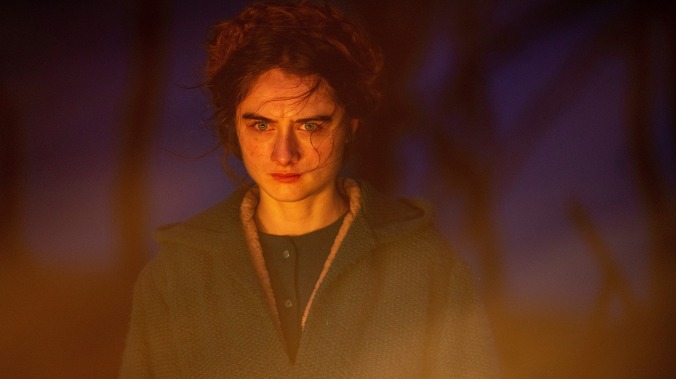The wives wear purple, the daughters blue. It’s the quickest way to tell them apart. God knows age alone isn’t enough—not when some of the former are as young as the latter. They sit on opposite sides of the dinner table, color-coded to mark their respective roles in a very unconventional household. As one of the daughters, bright-eyed teenage Selah (Raffey Cassidy) knows her place in a hierarchy she was born into. But she also understands, in some unspoken way, that she’s competing against the women seated next to and across from her—that they’re all grasping for the attention and approval of the man at the head of the table, the one who looms over their shared life of seclusion and servitude.
The Shepherd (Michiel Huisman), as they call him, certainly strikes a holy pose, and not just because of his flowing locks and perfectly groomed facial hair. Christlike presence aside, there’s more Charles Manson in the combination family, sect, and harem he’s carved out for himself on the edge of civilization. Blood is a big part of the rules and rituals: Slitting a fox’s throat, he smears it like warpaint on the faces of his “flock” at the conclusion of a daily sermon. But when they bleed? That’s “impure”—a cause for quarantine and repentance. Only women are welcome at the commune, and as it becomes disturbingly clear early on, the boundary between wife and daughter may be less rigid than the dress code suggests. It’s why Selah, perhaps, gins up the courage to break rank and the rules: “You’ve only just come here,” she snaps at a purple-draped new arrival. Who is this peer in all but hue of frock to threaten her own changing bond with the father she thinks of as more than a father?
The Other Lamb, the English-language debut of Polish director Malgorzata Szumowska (Elles), unfolds almost entirely from Selah’s perspective, blinkered until it isn’t. When not locking in close on the burning intensity of her gaze, it’s warping the reality of the world through her eyes, via visions of watery doom, nightmares of dead animals, and the way the wilderness itself seems to bend and stretch, leafless trees sloping at odd angles like something out of a grim (or Grimm) fairy tale. Szumowska made a name for herself as a producer on Lars von Trier’s Antichrist, and there’s a bit of that provocation’s doom-and-gloom unreality in the painterly sprawl of the movie’s backwoods backdrop. (Sadly, no animals turn to bellow their thoughts on chaos, though Selah does make eye contact with a highly symbolic sheep fetus.)
The best dramas about cults, like Sean Durkin’s drenched-in-dread Martha Marcy May Marlene, demystify brainwashing; their dark fascination lies in the insidious process of breaking believers down, step by step, until nothing remains but zealous devotion. The Other Lamb, on the other hand, is often as foggy as the forest surrounding the group’s encampment on the hows of The Shepherd’s indoctrination. “You all came to me broken,” he says to the older converts (most of the young ones, the daughters being groomed for an ascent into wifehood, have never known anything else), but the script by C.S. McMullen takes as a given his charlatan sway over them. Mostly, Szumowska leans on Huisman’s fashion-model looks—or perhaps on memories of his creepier, more insinuating performance as a cult leader in The Invitation. Though the film circles the question of what happened to Selah’s mother, it’s less pressing than the mystery as to how The Shepherd has preserved his polygamist scam for decades on the strength of a few platitudes about purification.
Set in some indeterminate time and place rarely betrayed by modern technology or dress, The Other Lamb mostly operates in the realm of allegory. Chased out of its rustic home base by local authorities, the roughly dozen-deep congregation embarks on a long, arduous pilgrimage toward an unknown Eden, and Selah’s gradual awakening to what’s unshakably wrong about her upbringing begins to look like a general reckoning for abusive patriarchy. But though the young lead summons some quaking adolescent soul (Cassidy, remember, played a teenage lamb to the slaughter in The Killing Of A Sacred Deer), Selah isn’t much more of a character than the unnamed women she sleeps and works beside. Then again, how can any of them emerge as distinct personalities, given how fully their identities have been subsumed by an abusive false prophet? Only Denise Gough’s Sarah, the most embittered of the middle-aged devotees The Shepherd has pushed to the margins, manages to communicate a concrete emotional reality; when she confesses that she’s stuck around because she has no idea who she is anymore, it speaks greater volumes about the scary appeal and obliterating power of cults than anything else in this dreamlike drama.













![Rob Reiner's son booked for murder amid homicide investigation [Updated]](https://img.pastemagazine.com/wp-content/avuploads/2025/12/15131025/MixCollage-15-Dec-2025-01-10-PM-9121.jpg)

























![HBO teases new Euphoria, Larry David, and much more in 2026 sizzle reel [Updated]](https://img.pastemagazine.com/wp-content/avuploads/2025/12/12100344/MixCollage-12-Dec-2025-09-56-AM-9137.jpg)

